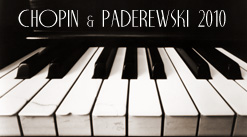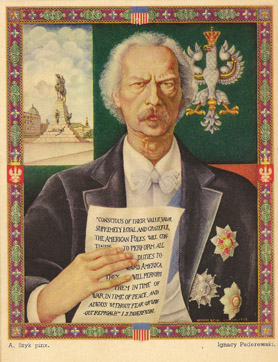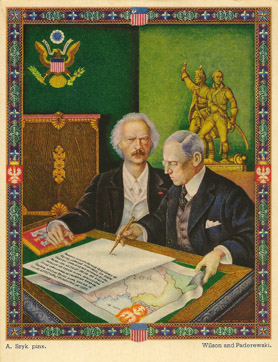 |
HOME | CHOPIN | PADEREWSKI | EVENTS | CONTACT |
||||||

|
 |
||||||
Images to the right: Postcards with art by Arthur Szyk printed in Poland in 1939 |
|||||||
In his time, Ignacy
Jan Paderewski (1860- 1941) was called a “Modern Immortal.” Audiences worldwide stormed the stage after his piano recitals, with young women strewing flowers at his feet. Admirers pressed for autographs and frenzied fans once burst into his private hotel room with scissors, determined to clip a bit of his famous, curly red locks for a souvenir. Regarded as the best interpreter of fellow composer and countryman, Fryderyk Chopin, he was also renowned for vigorous renditions of Bach and Beethoven. After his first American tour in 1891-92 he referred to the U.S. as “the country of my heart, my second home.” He gave more than 1500 concerts in 200 American cities, playing in 48 states in a musical career that spanned six decades and covered every continent. Throngs crushed the streets to glimpse Paderewski when he arrived triumphantly in Warsaw in 1919. He and President Woodrow Wilson had secured the re- establishment of the Polish nation as co- signers of the Treaty of Versailles. Paderewski’s knowledge of languages was so nimble that he was the only participant of the Conference not to require an interpreter. To show his gratitude to Wilson, in 1931 he built the Woodrow Wilson Monument in Poznan, Poland. Paderewski’s fierce love for his country drove him to halt his global concert tours and serve as Prime Minister of Poland during its brief years of independence. Paderewski’s generosity was boundless. Multitudes of musicians and writers, the poor, ill, and homeless benefited from his charity. In 1895 he founded the Paderewski Fund in New York to award prizes to American composers. Throughout his life he established scholarships and competitions, donated pianos to music conservatories, and held concert tours to raise funds for victims of war, the unemployed, and the destitute. During his lifetime Paderewski was awarded honors from Belgium, Britain, France, Germany, Italy, Poland, Romania, and Spain, among others. Honorary doctorates from European and American universities include some of the world’s most prestigious — Oxford, Cambridge, Yale, Columbia, and the Jagellonian. 2010, the 150th anniversary of his birth, is a fitting time to pay tribute to Ignacy Jan Paderewski — artist, statesman, and philanthropist — an enduring champion of freedom and universal values. Victoria Granacki |
|||||||
| ------------------------------------------------------------ PADEREWSKI’S HONORARY DOCTORATES Lvov University, Poland (1912) Yale University, New Haven, CT, USA (1917) Jagellonean University, Krakow, Poland (1919) Oxford University, England, UK (1919) Columbia University, New York, NY, USA (1922) University of Southern California, Los Angeles, CA, USA (1923); click here for more information Poznan University, Poland (1924) Glasgow University, Scotland, UK (1925) Cambridge University, England, UK (1926) Warsaw University, Poland (1926) Lausanne University, Switzerland (1932) New York University, NY, USA (1933) --------------------------------------------------------------- Support for students, professors and artists - selections Support for students of Stanford University, USA, 1896; one of them was Herbert Clark Hoover, the future president of the United States An Erard piano for the Academy of St. Cecilia, Rome, Italy, 1897 A Steinway piano for the Warsaw Conservatory of Music, 1909 Support for the Moscow Conservatory Students Fund, and concerts given for charitable purposes, Moscow, Russia, 1899 5,000 marks for the Beethoven Scholarship, Bonn, Germany, 1901 Gift for Polish children of Wrzesnia persecuted in the area of Prussian partition, Poznan, Poland, 1901 12,000 francs for the relief fund of the Conservatory Professors in Paris, France1909 Prizes at the composers’ competition on the occasion of the 100th anniversary of Chopin’s birth, Lvov, Poland, 1910 Help for Polish students in Freiburg, Germany, 1910 1,000 rubles for the Music Society in St. Petersburg, Russia,1899 Scholarship Fund for Ecole Normale, Paris, France, 1923 Help for orphanages in Illinois, USA, Chicago, 1924 Donation for the Center of Motherhood in New York, USA,1924 Scholarships for Polish pianists and composers in Paris, France,1928-1930 Last will assigning his property to the Jagellonian University in Krakow, Poland and payment for the members of the Board of Directors, 1930 Support for student organizations in France, 1931 Support for the Violin Music Competition of Eugène Saye in Brussels, Belgium,1937 Organized Helena Modrzejewska's (Modjeska) benefit concert at the Metropolitan Opera House, New York, USA, 1905 Organized multiple orchestra benefit concerts in New York, USA1905 |
--------------------------------------------------------------- PADEREWSKI’S MEDALS AND DECORATIONS The Royal Saxon “Albertus Animosus” Order (Germany 1895) The Medal of the Romanian Crown “Prin noi insine” (Romania 1889) The Cross and Ribbon of the “Virtuti et Merito” (Spain 1906) The Order of the White Eagle Great Ribbon (Poland 1921) The Order “Polonia Restituta” Great Ribbon (Poland 1923) The Order of Leopold Great Ribbon (Belgium 1924) Grand Cross of the Order of the British Empire (British knighthood 1925) The Order of Saints Maurice and Lazarus Great Ribbon (Italy 1925) The Silver Cross of the Honorary League (France 1929) The Cross of the Lombard Crown Medal (France) The Cross “Virtuti Militari” (Poland 1941-- posthumous) ----------------------------------------------------------------- After his US tour in 1896, Paderewski left $10,000 ---------------------------------------------------- In January 1897, Paderewski funded two In the literary competition the prizes were received --------------------------------------------------------------------- Washington Square Arch, New York, USA, 1892 |
 |
|||||
| © 2009-2011 The Organizing Committee for Chopin & Paderewski 2010 celebrations, USA | |||||||